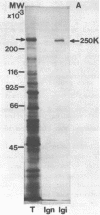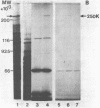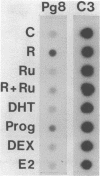Abstract
A cDNA clone corresponding to an mRNA regulated by the progestin R5020, has been isolated by differential screening of a cDNA library from the MCF7 breast cancer cell line, which contains estrogen and progesterone receptors. This probe hybridized with a single species of poly A + RNA of 8-kb molecular weight as shown by Northern blot analysis and could also be used to total RNA preparation. This recombinant clone hybridized specifically to an mRNA coding for a 250,000 daltons protein when translated in vitro. This protein was identical to the 250 kDa progestin-regulated protein that we previously described (Biochem. Biophys. Res. Commun. 121, 421-427, 1984) as shown by immunoprecipitation with specific rabbit polyclonal antibodies. Dose-response curve and specificity studies show that the accumulation of the Pg8 mRNA and that of the 250-kDa protein was increased by 5 to 30-fold following progestin treatment and that this effect was mediated by the progesterone receptor. Time course of induction indicated that the accumulation of mRNA was rapid and preceded that of the protein. This is the first report on a cloned cDNA probe of progestin-regulated mRNA in human cell lines.
Full text
PDF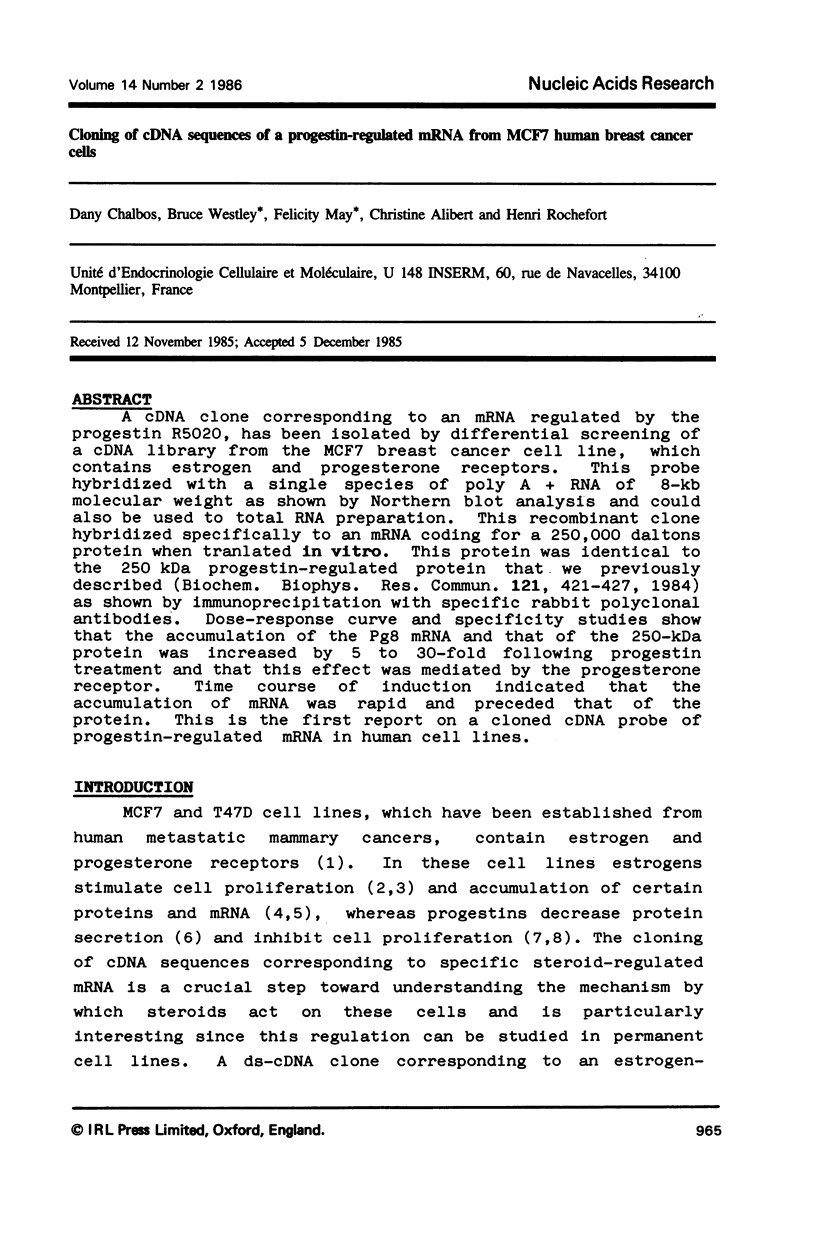
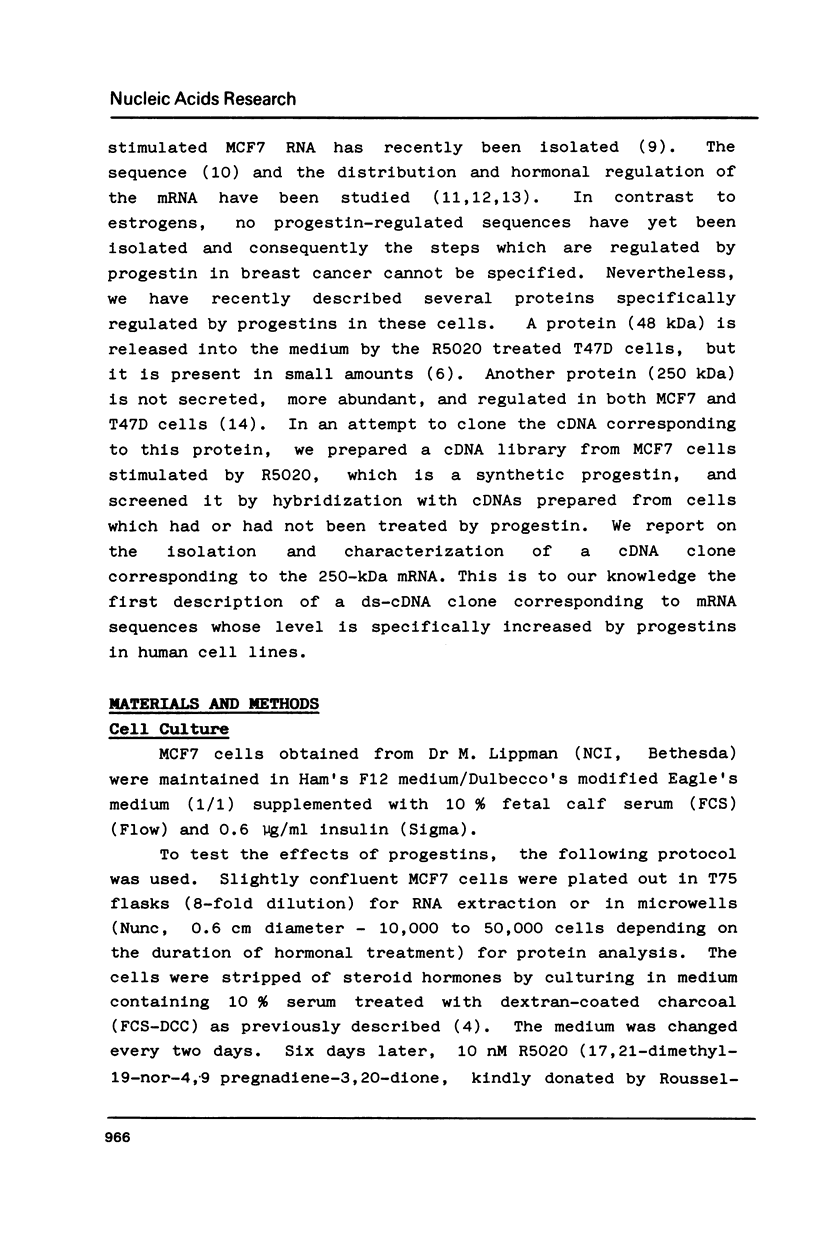
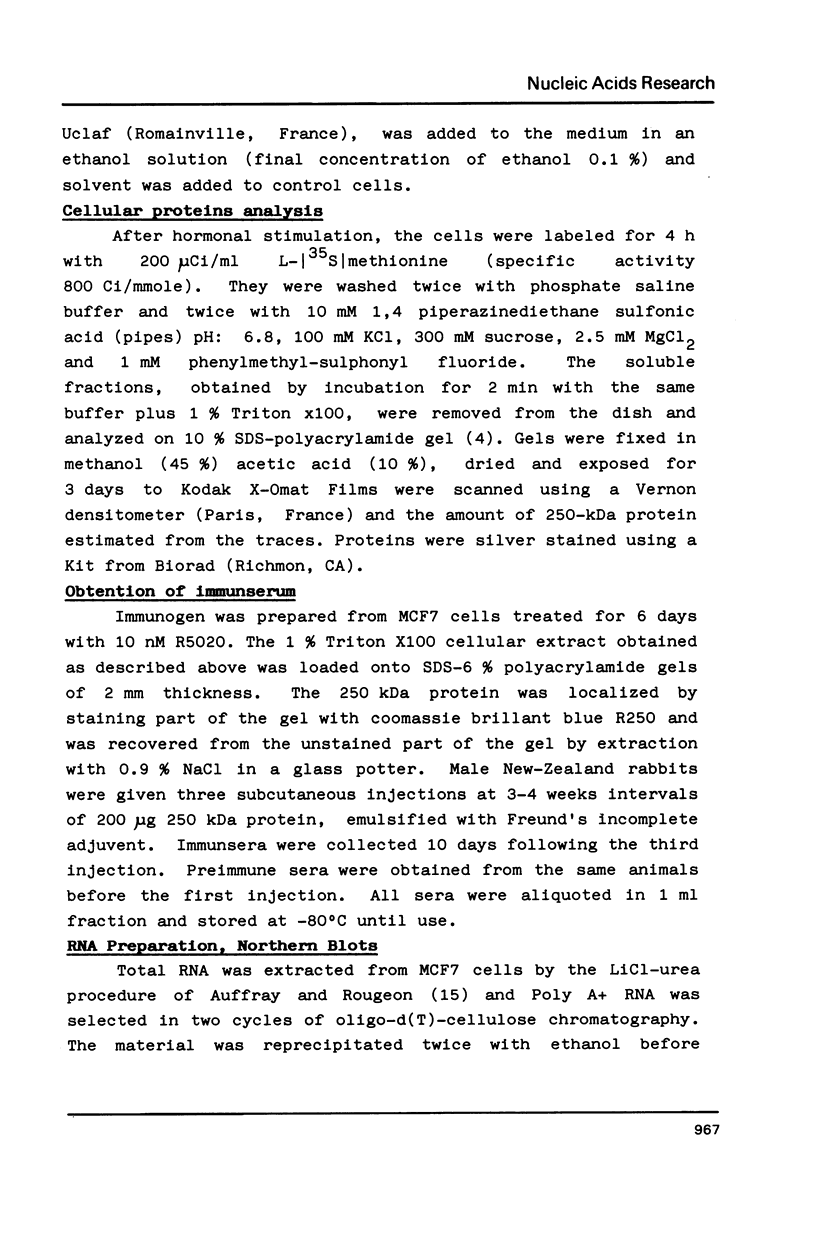
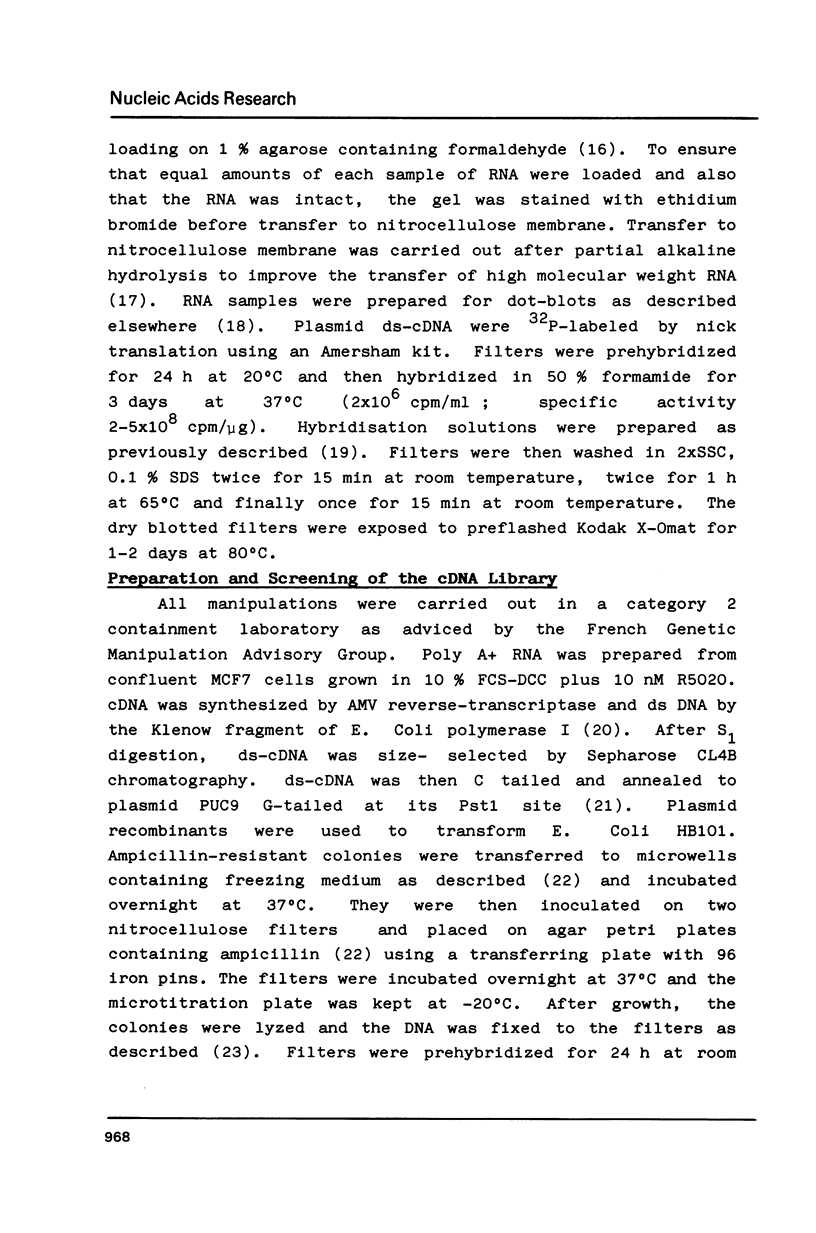
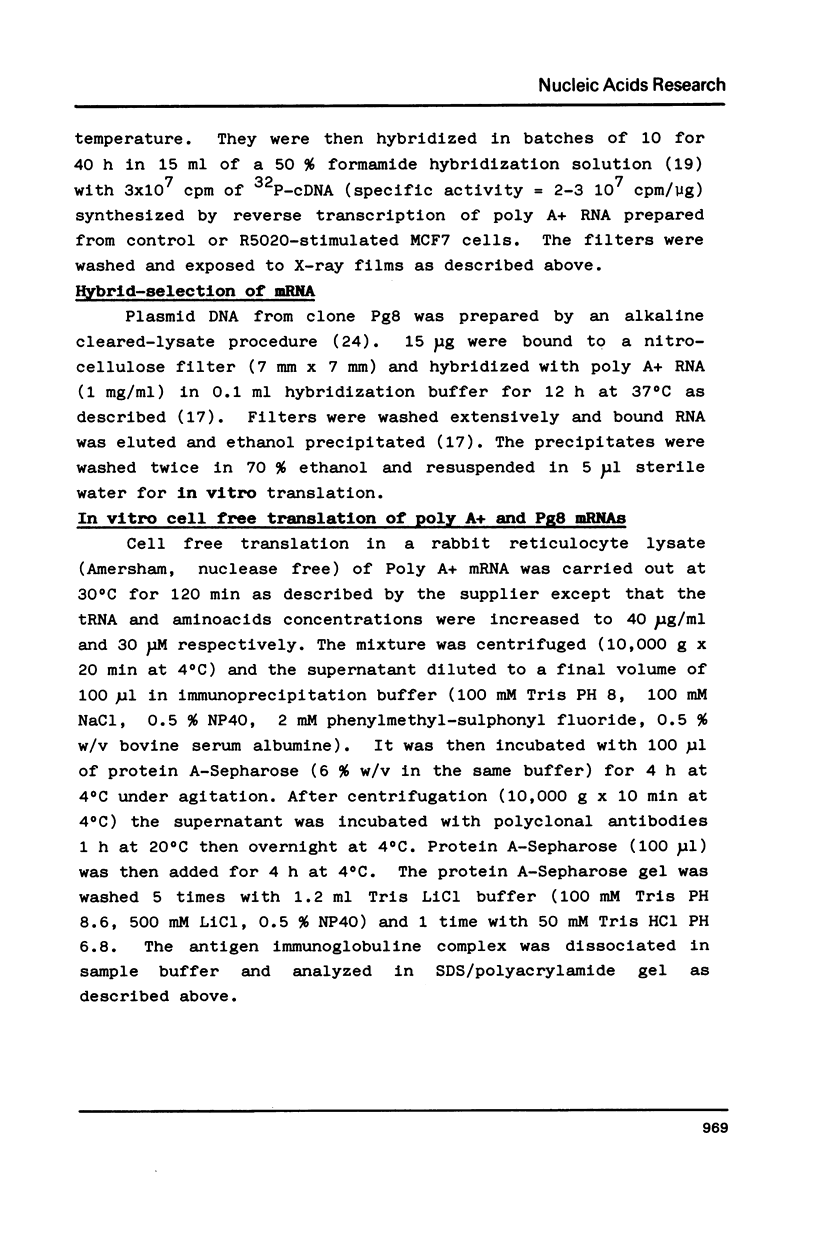
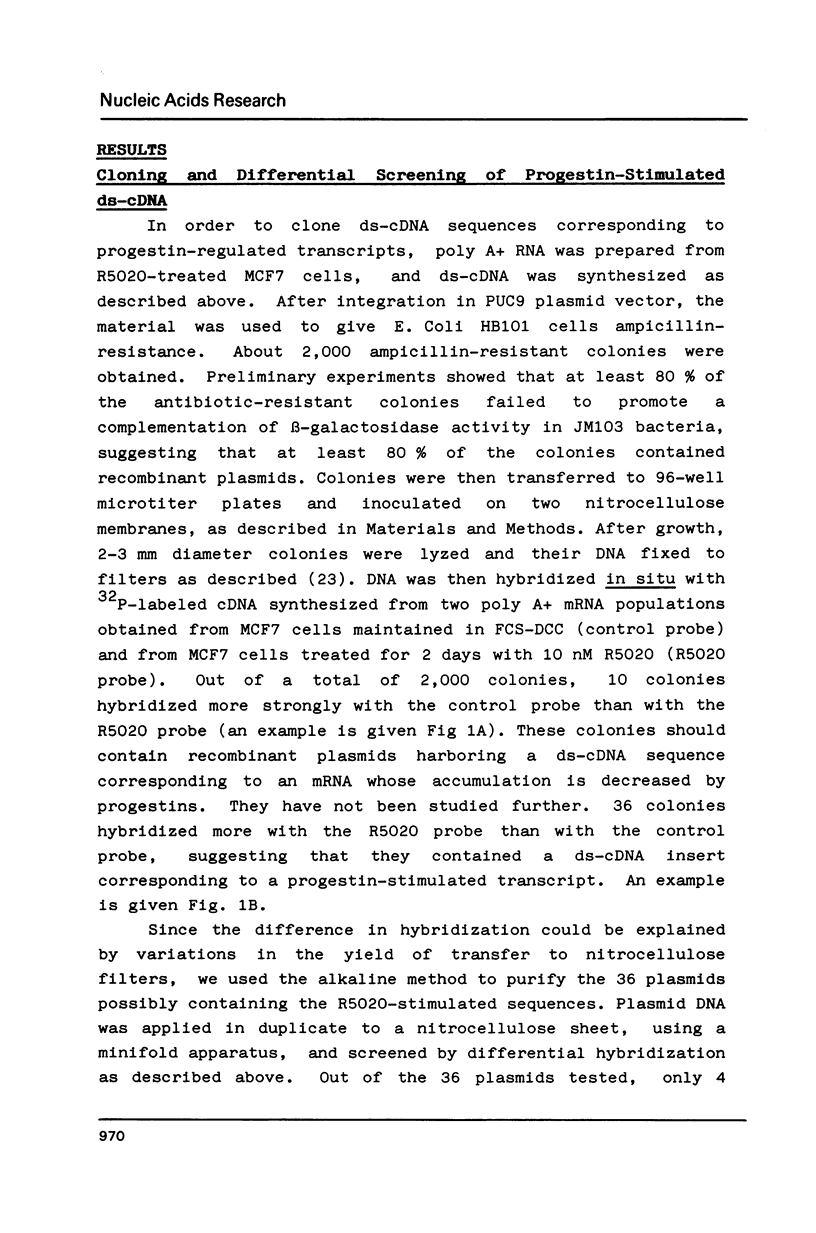
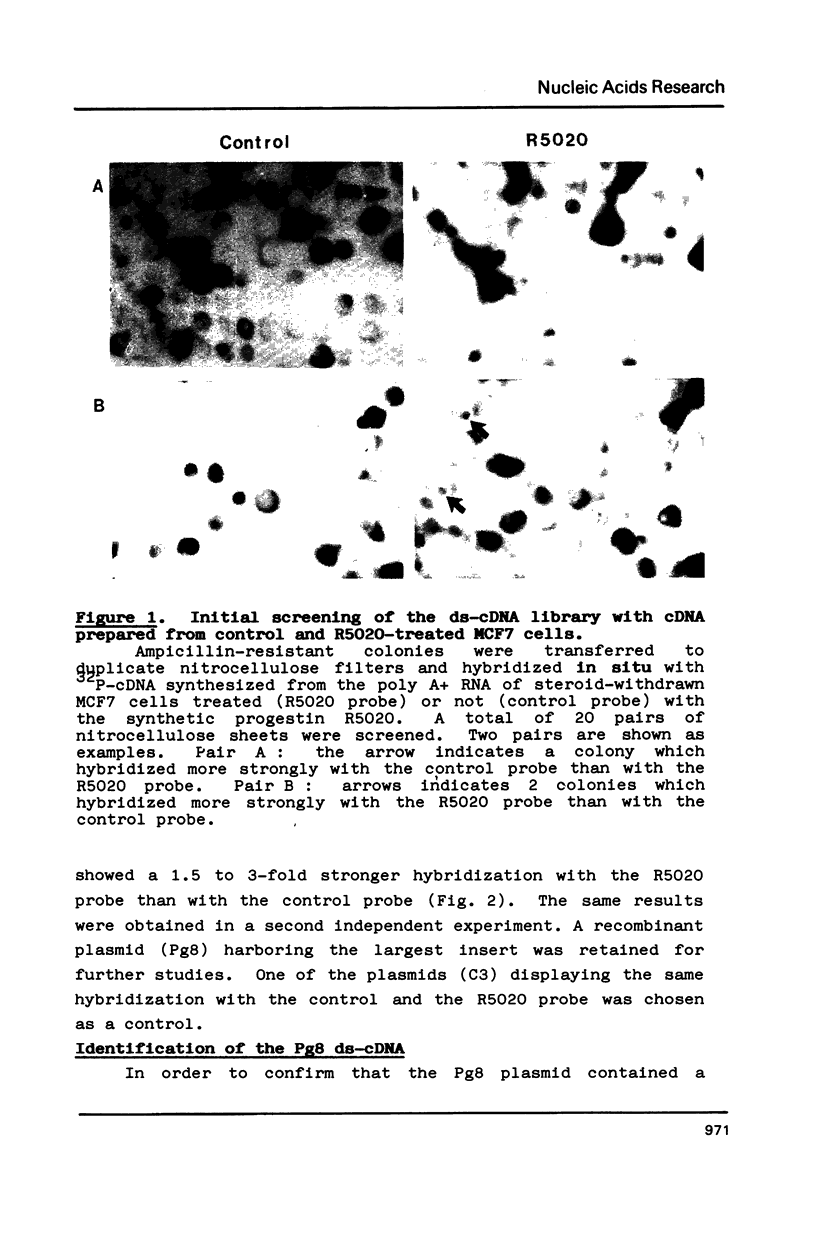
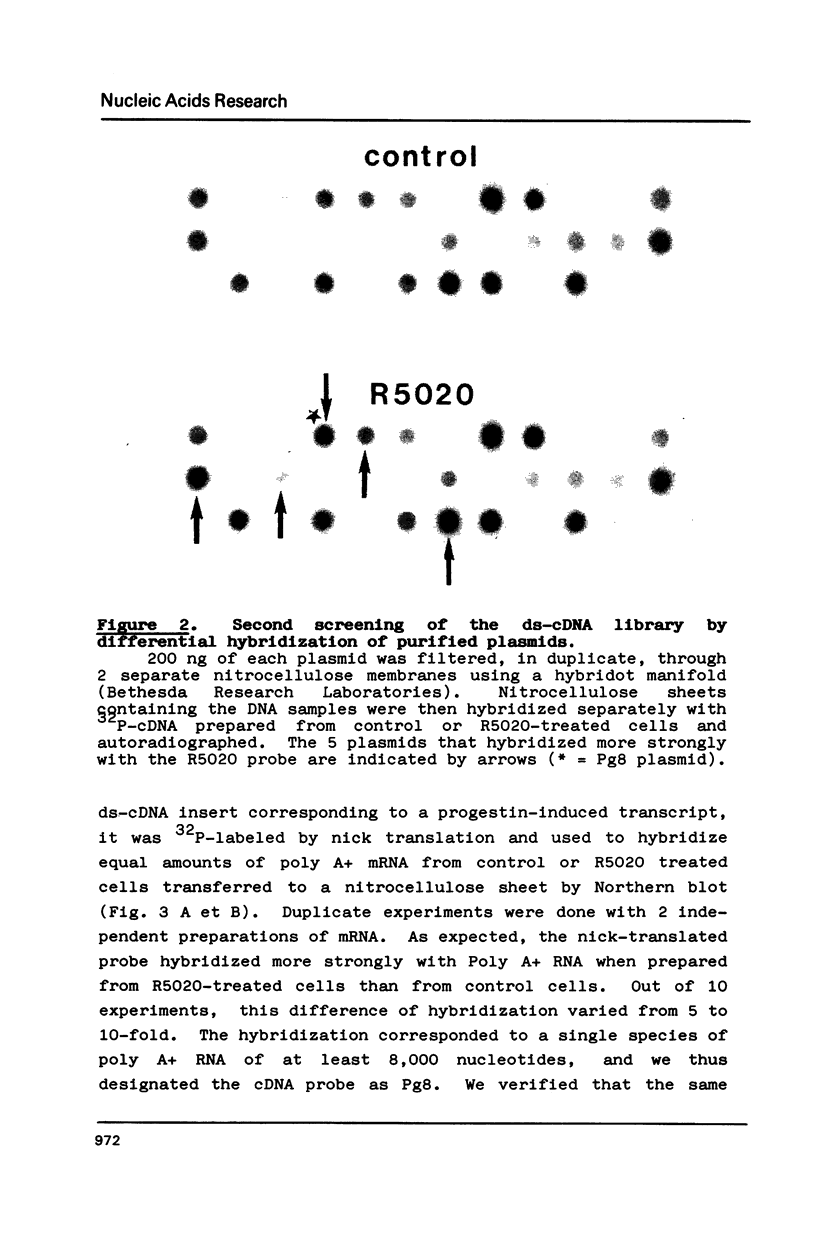
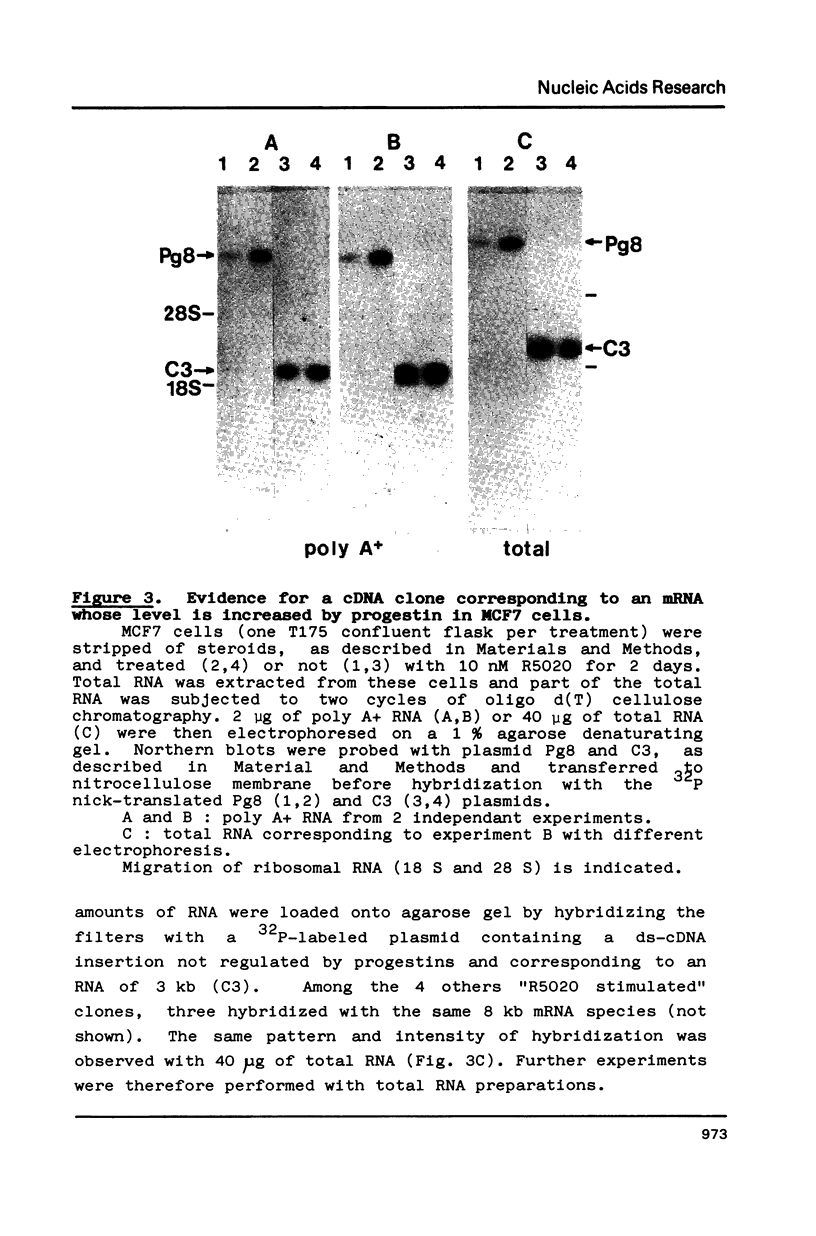
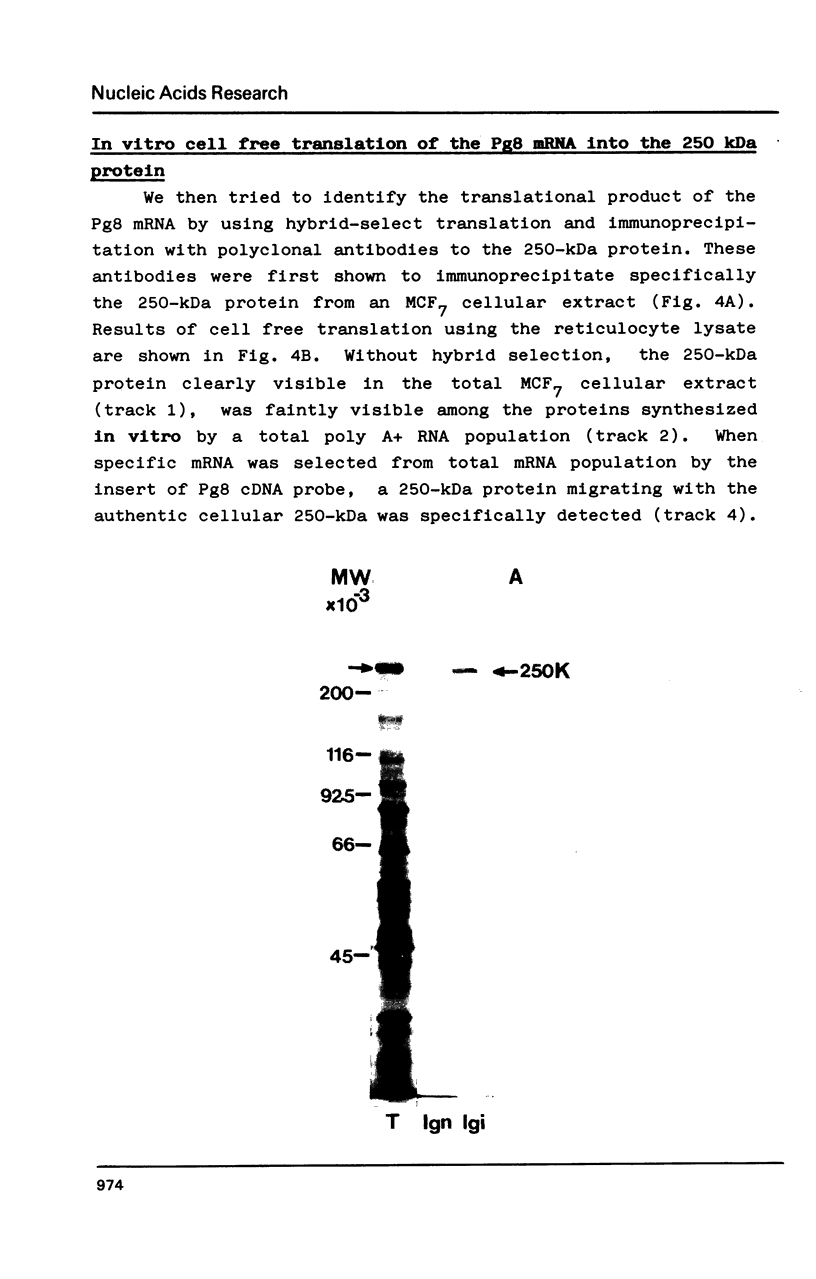
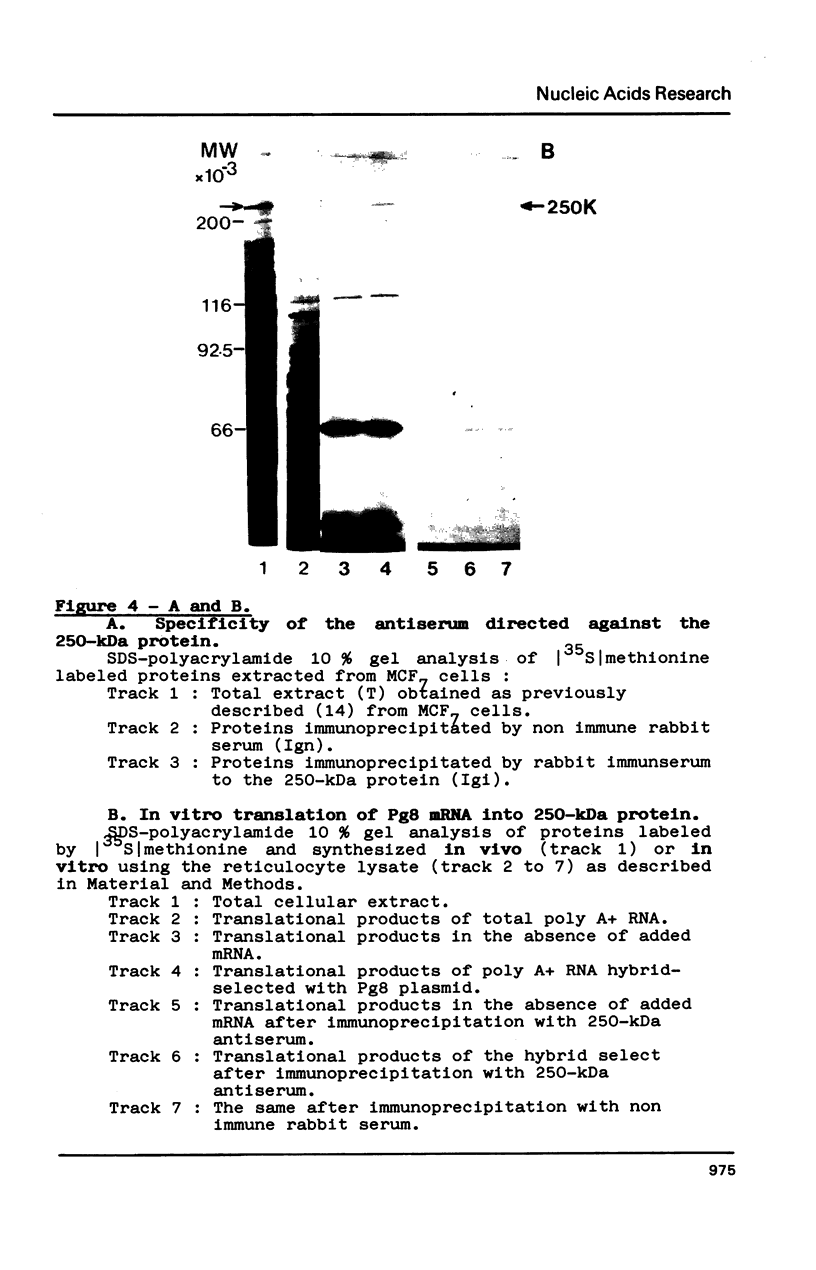
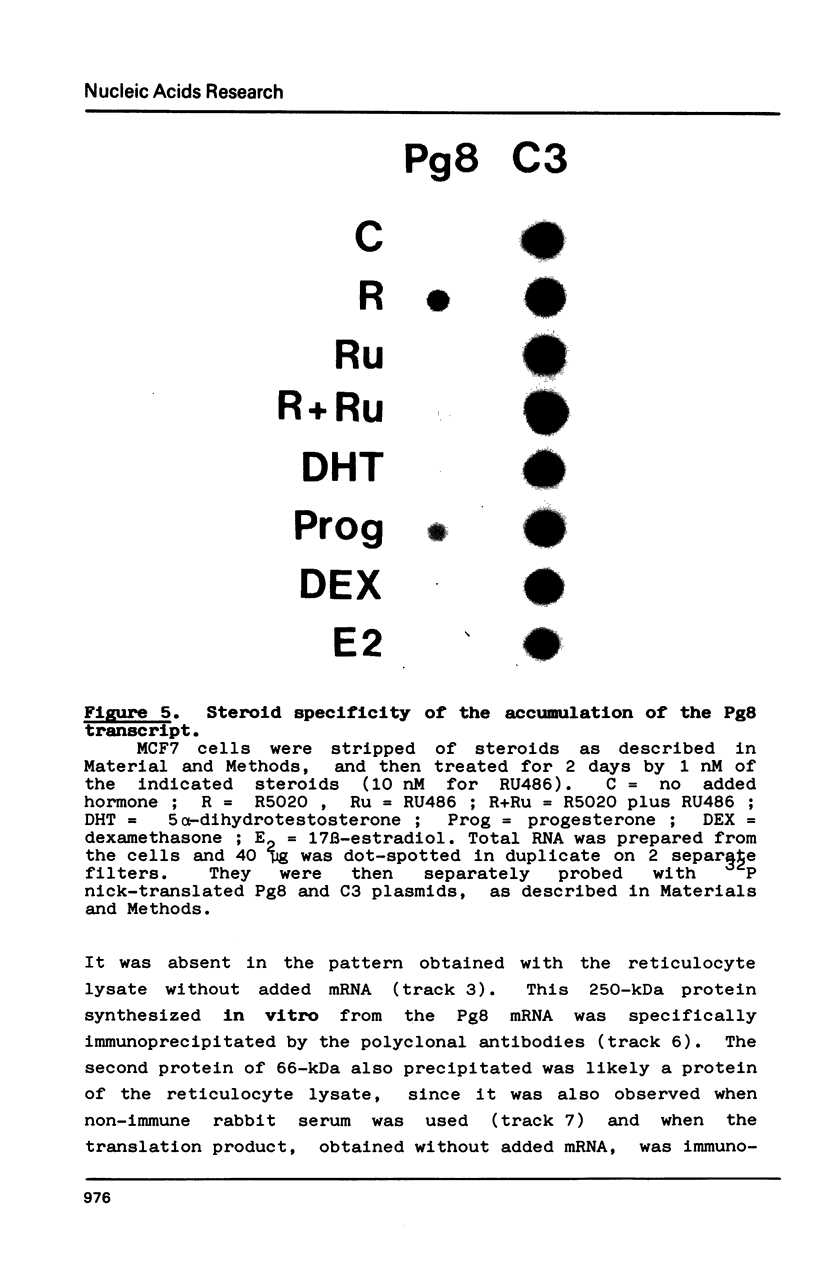
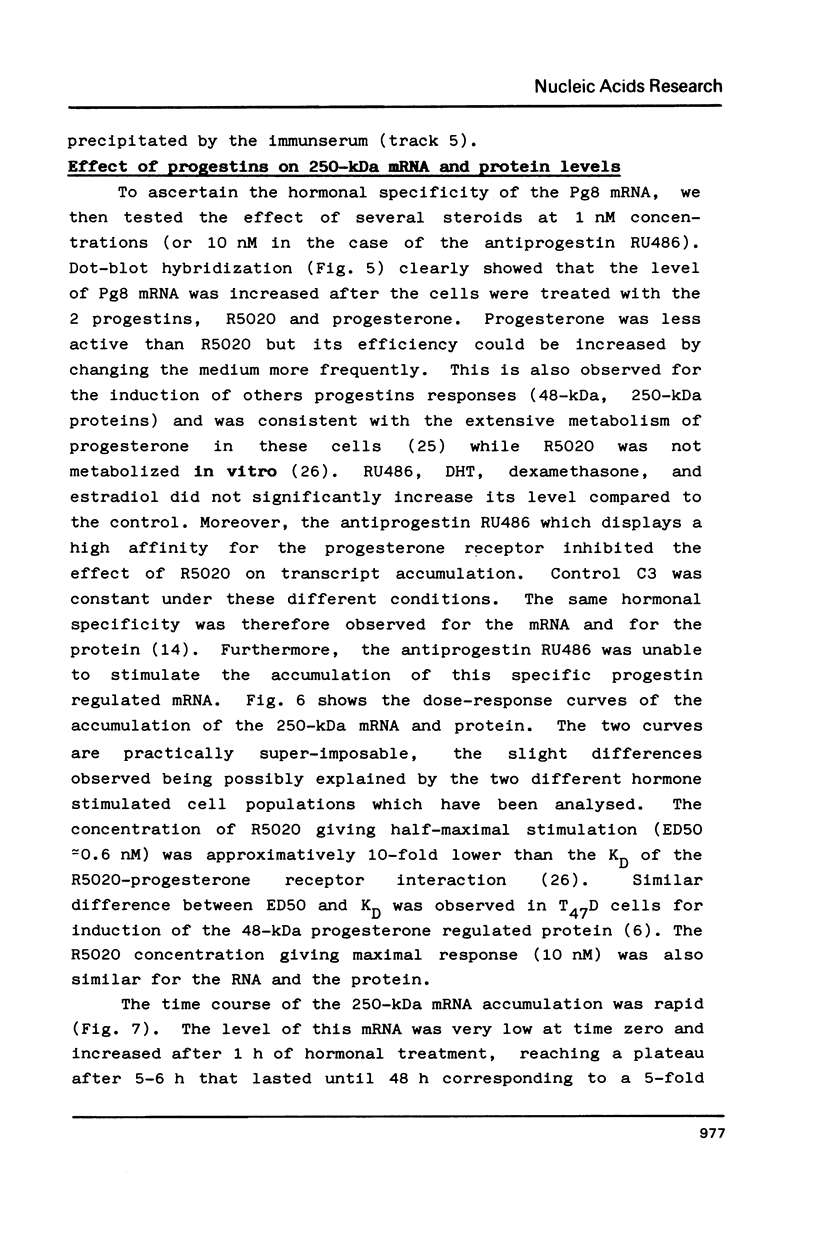
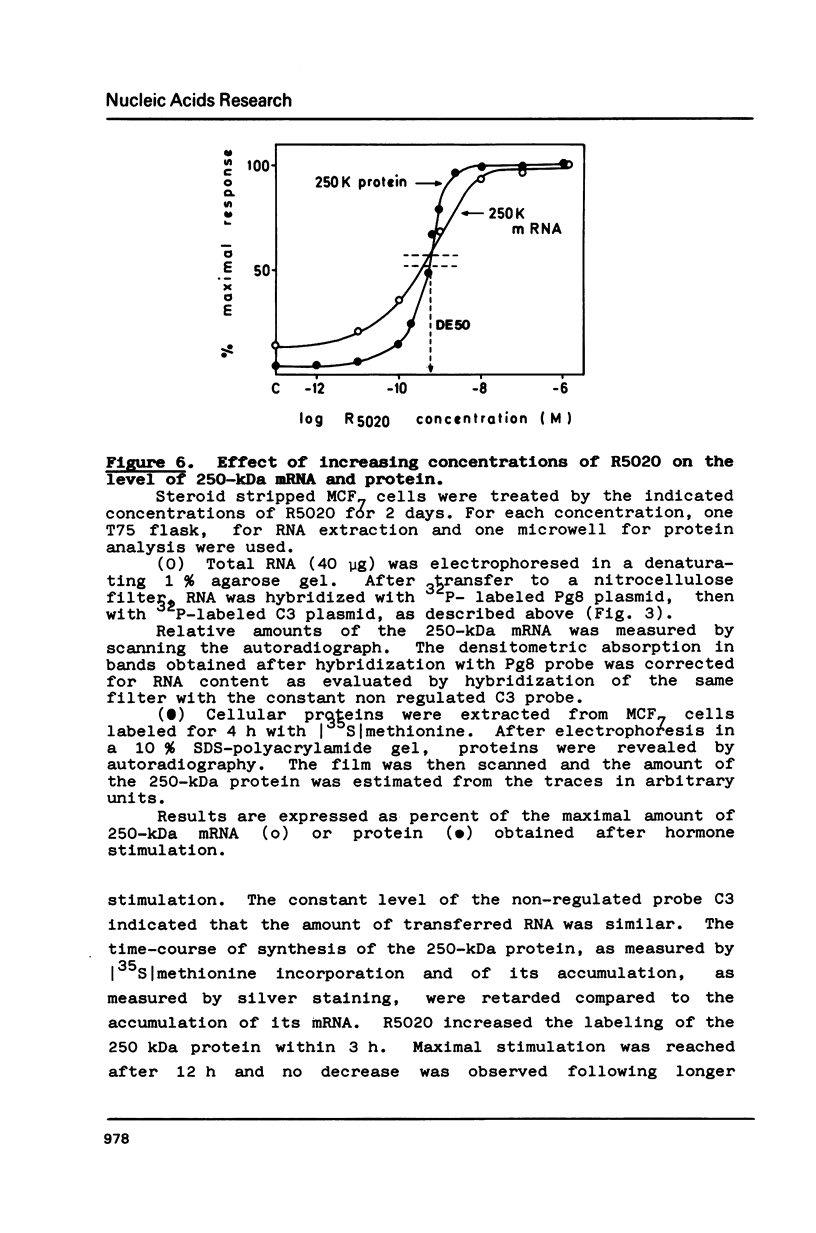
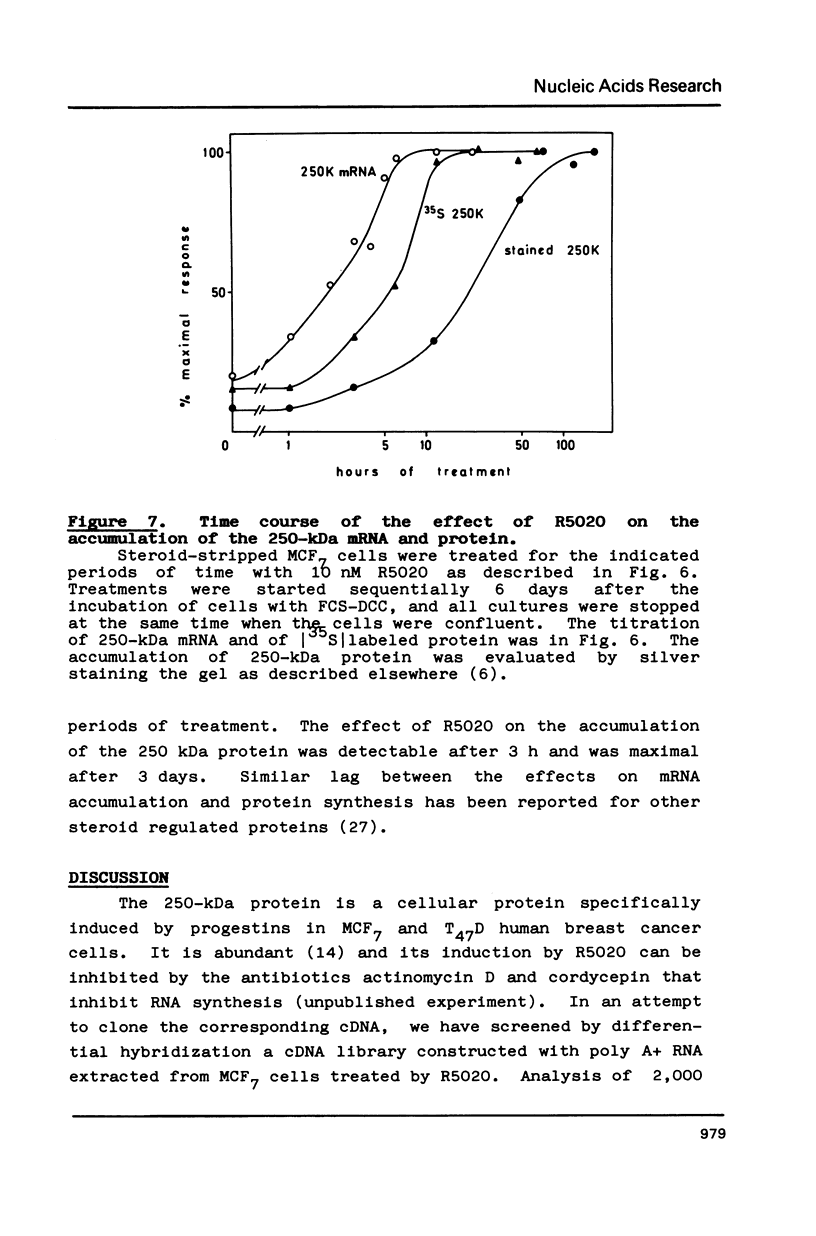
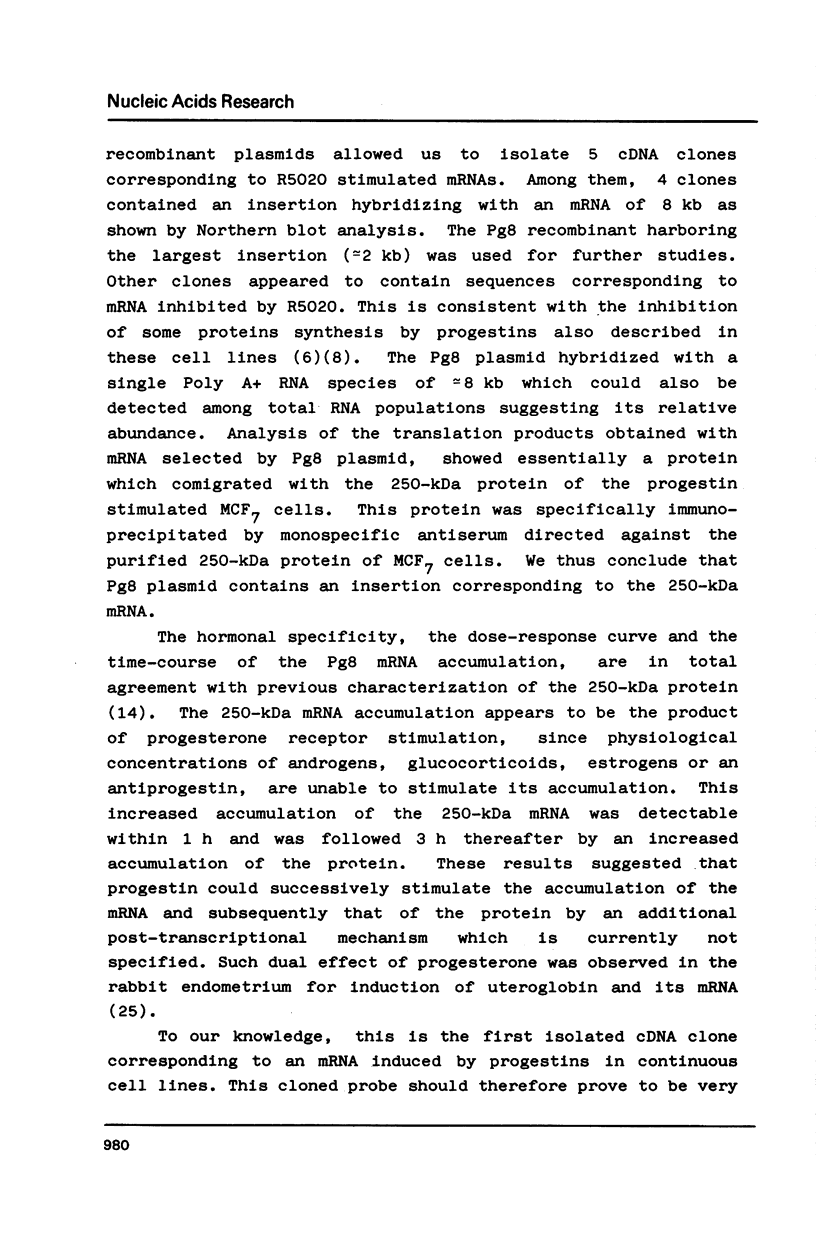
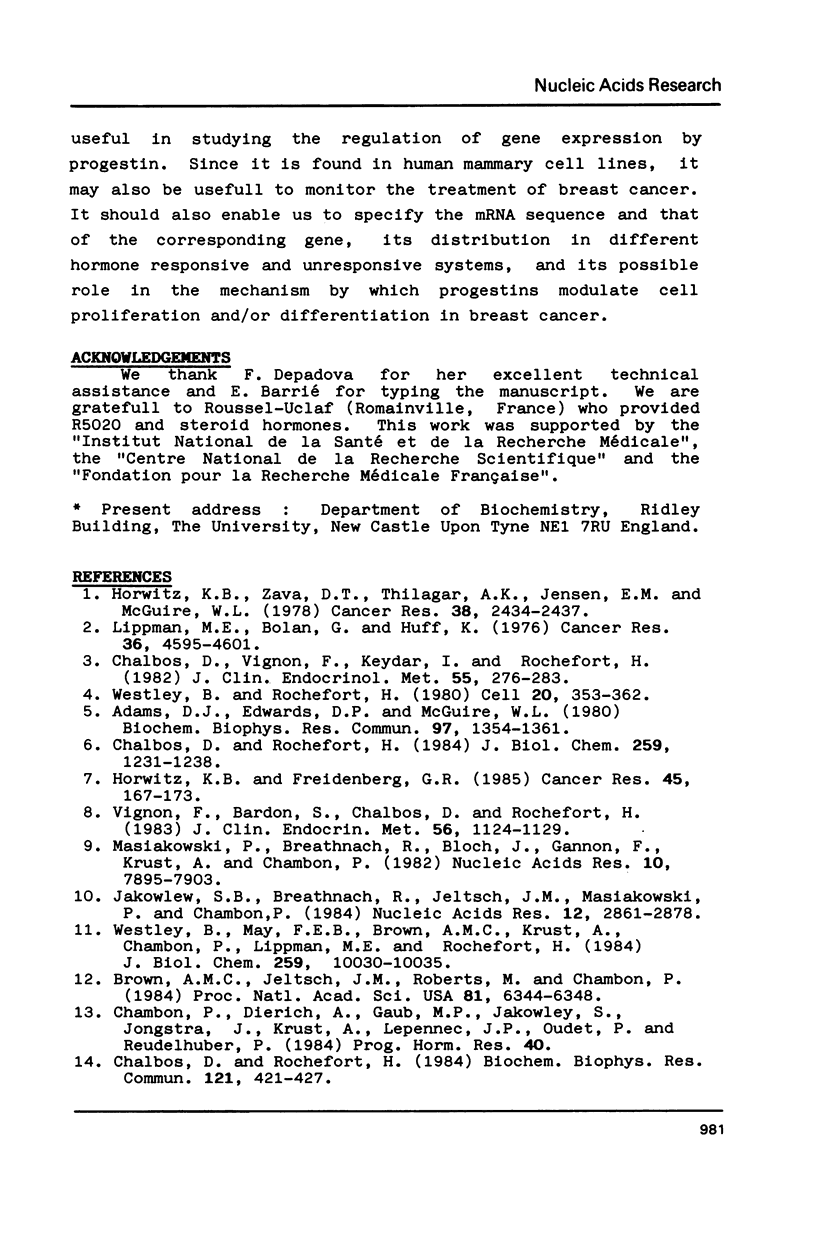
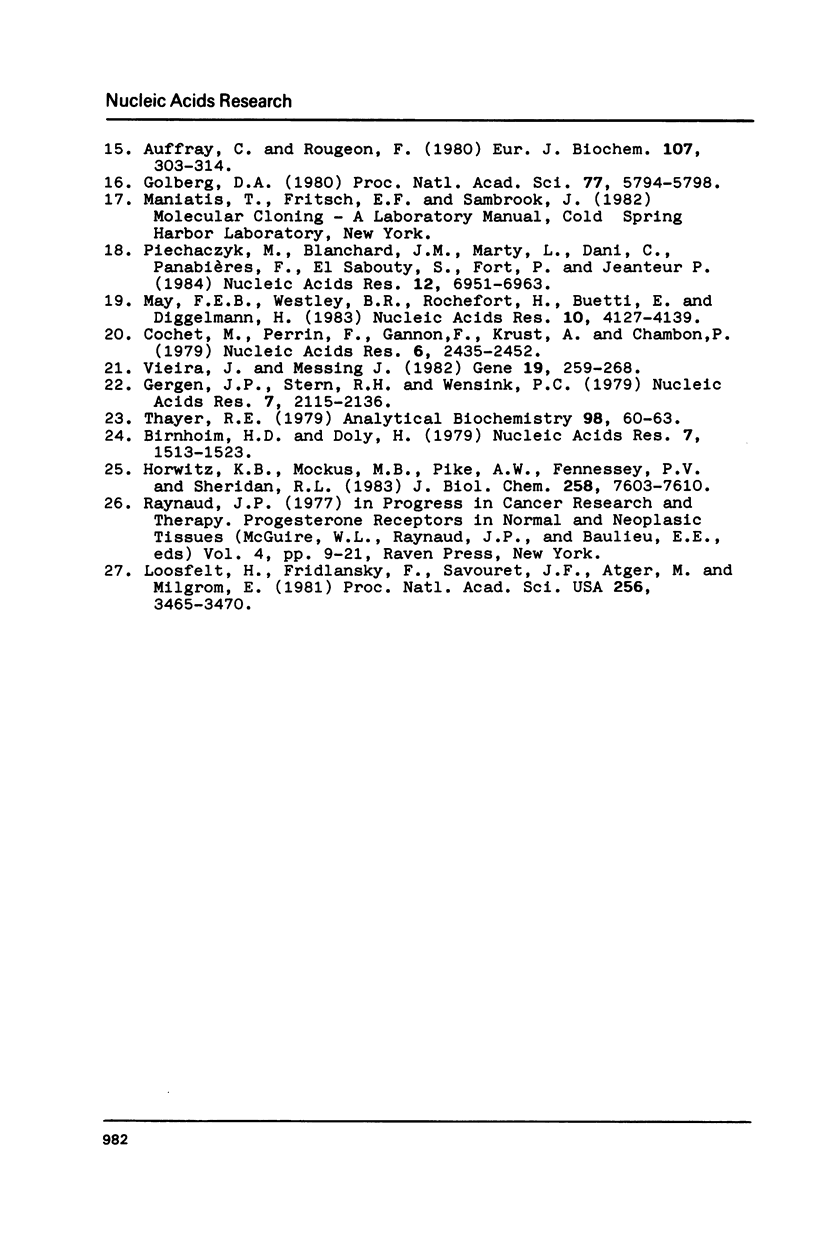
Images in this article
Selected References
These references are in PubMed. This may not be the complete list of references from this article.
- Adams D. J., Edwards D. P., McGuire W. L. Estrogen regulation of specific messinger RNA's in human breast cancer cells. Biochem Biophys Res Commun. 1980 Dec 31;97(4):1354–1361. doi: 10.1016/s0006-291x(80)80016-7. [DOI] [PubMed] [Google Scholar]
- Auffray C., Rougeon F. Purification of mouse immunoglobulin heavy-chain messenger RNAs from total myeloma tumor RNA. Eur J Biochem. 1980 Jun;107(2):303–314. doi: 10.1111/j.1432-1033.1980.tb06030.x. [DOI] [PubMed] [Google Scholar]
- Birnboim H. C., Doly J. A rapid alkaline extraction procedure for screening recombinant plasmid DNA. Nucleic Acids Res. 1979 Nov 24;7(6):1513–1523. doi: 10.1093/nar/7.6.1513. [DOI] [PMC free article] [PubMed] [Google Scholar]
- Brown A. M., Jeltsch J. M., Roberts M., Chambon P. Activation of pS2 gene transcription is a primary response to estrogen in the human breast cancer cell line MCF-7. Proc Natl Acad Sci U S A. 1984 Oct;81(20):6344–6348. doi: 10.1073/pnas.81.20.6344. [DOI] [PMC free article] [PubMed] [Google Scholar]
- Chalbos D., Rochefort H. A 250-kilodalton cellular protein is induced by progestins in two human breast cancer cell lines MCF7 and T47D. Biochem Biophys Res Commun. 1984 Jun 15;121(2):421–427. doi: 10.1016/0006-291x(84)90199-2. [DOI] [PubMed] [Google Scholar]
- Chalbos D., Rochefort H. Dual effects of the progestin R5020 on proteins released by the T47D human breast cancer cells. J Biol Chem. 1984 Jan 25;259(2):1231–1238. [PubMed] [Google Scholar]
- Chalbos D., Vignon F., Keydar I., Rochefort H. Estrogens stimulate cell proliferation and induce secretory proteins in a human breast cancer cell line (T47D). J Clin Endocrinol Metab. 1982 Aug;55(2):276–283. doi: 10.1210/jcem-55-2-276. [DOI] [PubMed] [Google Scholar]
- Cochet M., Perrin F., Gannon F., Krust A., Chambon P., McKnight G. S., Lee D. C., Mayo K. E., Palmiter R. Cloning of an almost full-length chicken conalbumin double-stranded cDNA. Nucleic Acids Res. 1979 Jun 11;6(7):2435–2452. doi: 10.1093/nar/6.7.2435. [DOI] [PMC free article] [PubMed] [Google Scholar]
- Gergen J. P., Stern R. H., Wensink P. C. Filter replicas and permanent collections of recombinant DNA plasmids. Nucleic Acids Res. 1979 Dec 20;7(8):2115–2136. doi: 10.1093/nar/7.8.2115. [DOI] [PMC free article] [PubMed] [Google Scholar]
- Goldberg D. A. Isolation and partial characterization of the Drosophila alcohol dehydrogenase gene. Proc Natl Acad Sci U S A. 1980 Oct;77(10):5794–5798. doi: 10.1073/pnas.77.10.5794. [DOI] [PMC free article] [PubMed] [Google Scholar]
- Horwitz K. B., Freidenberg G. R. Growth inhibition and increase of insulin receptors in antiestrogen-resistant T47DCO human breast cancer cells by progestins: implications for endocrine therapies. Cancer Res. 1985 Jan;45(1):167–173. [PubMed] [Google Scholar]
- Horwitz K. B., Mockus M. B., Pike A. W., Fennessey P. V., Sheridan R. L. Progesterone receptor replenishment in T47D human breast cancer cells. Roles of protein synthesis and hormone metabolism. J Biol Chem. 1983 Jun 25;258(12):7603–7610. [PubMed] [Google Scholar]
- Horwitz K. B., Zava D. T., Thilagar A. K., Jensen E. M., McGuire W. L. Steroid receptor analyses of nine human breast cancer cell lines. Cancer Res. 1978 Aug;38(8):2434–2437. [PubMed] [Google Scholar]
- Jakowlew S. B., Breathnach R., Jeltsch J. M., Masiakowski P., Chambon P. Sequence of the pS2 mRNA induced by estrogen in the human breast cancer cell line MCF-7. Nucleic Acids Res. 1984 Mar 26;12(6):2861–2878. doi: 10.1093/nar/12.6.2861. [DOI] [PMC free article] [PubMed] [Google Scholar]
- Lippman M., Bolan G., Huff K. The effects of estrogens and antiestrogens on hormone-responsive human breast cancer in long-term tissue culture. Cancer Res. 1976 Dec;36(12):4595–4601. [PubMed] [Google Scholar]
- Loosfelt H., Fridlansky F., Savouret J. F., Atger M., Milgrom E. Mechanism of action of progesterone in the rabbit endometrium. Induction of uteroglobin and its messenger RNA. J Biol Chem. 1981 Apr 10;256(7):3465–3470. [PubMed] [Google Scholar]
- Masiakowski P., Breathnach R., Bloch J., Gannon F., Krust A., Chambon P. Cloning of cDNA sequences of hormone-regulated genes from the MCF-7 human breast cancer cell line. Nucleic Acids Res. 1982 Dec 20;10(24):7895–7903. doi: 10.1093/nar/10.24.7895. [DOI] [PMC free article] [PubMed] [Google Scholar]
- May F. E., Westley B. R., Rochefort H., Buetti E., Diggelmann H. Mouse mammary tumour virus related sequences are present in human DNA. Nucleic Acids Res. 1983 Jun 25;11(12):4127–4139. doi: 10.1093/nar/11.12.4127. [DOI] [PMC free article] [PubMed] [Google Scholar]
- Piechaczyk M., Blanchard J. M., Marty L., Dani C., Panabieres F., El Sabouty S., Fort P., Jeanteur P. Post-transcriptional regulation of glyceraldehyde-3-phosphate-dehydrogenase gene expression in rat tissues. Nucleic Acids Res. 1984 Sep 25;12(18):6951–6963. doi: 10.1093/nar/12.18.6951. [DOI] [PMC free article] [PubMed] [Google Scholar]
- Thayer R. E. An improved method for detecting foreign DNA in plasmids of Escherichia coli. Anal Biochem. 1979 Sep 15;98(1):60–63. doi: 10.1016/0003-2697(79)90705-x. [DOI] [PubMed] [Google Scholar]
- Vieira J., Messing J. The pUC plasmids, an M13mp7-derived system for insertion mutagenesis and sequencing with synthetic universal primers. Gene. 1982 Oct;19(3):259–268. doi: 10.1016/0378-1119(82)90015-4. [DOI] [PubMed] [Google Scholar]
- Vignon F., Bardon S., Chalbos D., Rochefort H. Antiestrogenic effect of R5020, a synthetic progestin in human breast cancer cells in culture. J Clin Endocrinol Metab. 1983 Jun;56(6):1124–1130. doi: 10.1210/jcem-56-6-1124. [DOI] [PubMed] [Google Scholar]
- Westley B., May F. E., Brown A. M., Krust A., Chambon P., Lippman M. E., Rochefort H. Effects of antiestrogens on the estrogen-regulated pS2 RNA and the 52- and 160-kilodalton proteins in MCF7 cells and two tamoxifen-resistant sublines. J Biol Chem. 1984 Aug 25;259(16):10030–10035. [PubMed] [Google Scholar]
- Westley B., Rochefort H. A secreted glycoprotein induced by estrogen in human breast cancer cell lines. Cell. 1980 Jun;20(2):353–362. doi: 10.1016/0092-8674(80)90621-2. [DOI] [PubMed] [Google Scholar]






